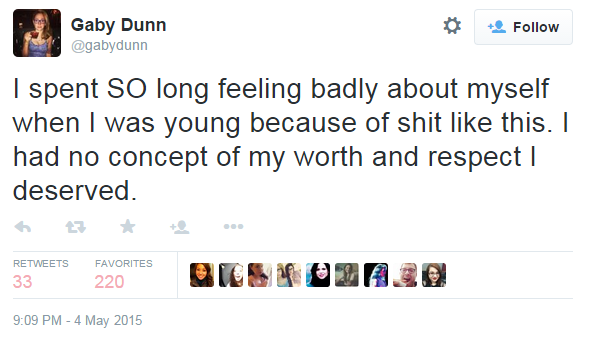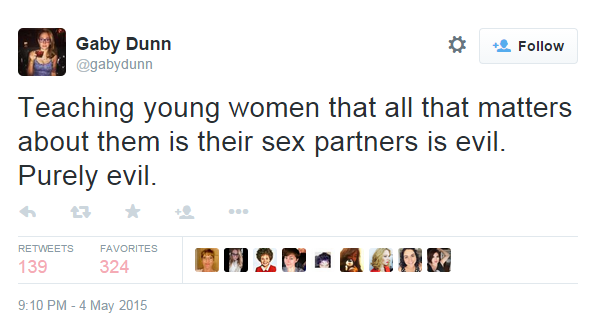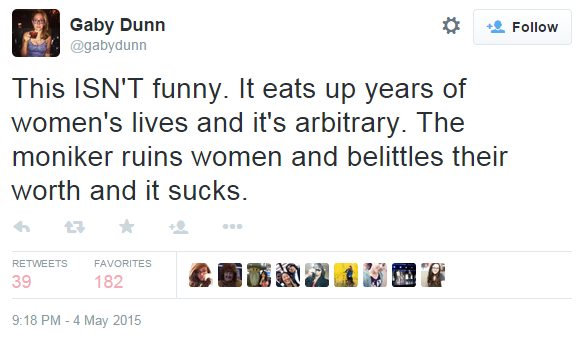Jeremy Renner And Others Guilty Of Slut-Shaming Should Be Held Accountable For Its Devastating Effects On Women

Four. That’s the average number of men that women aged 20 to 59 have sex with in their lifetime, The National Center for Health Statistics reports. Seven is the average number of women men have sex with in theirs. If you’re Jeremy Renner, however, the actor who plays Hawkeye in The Avengers: Age of Ultron, average is just another word for “slut.”
“She’s a slut,” he said of fellow Avenger Black Widow, who had been linked to not only his character, but Iron Man, Captain America, and Bruce Banner (the Hulk). "A complete whore,” Chris Evans, who plays Cap, added between laughs. While both actors issued an apology for their comments, Renner didn’t seem sorry. Anyone who suspected as much was validated during the actor’s recent appearance on Conan.
“Mind you, we are talking about a fictional character and fictional behavior, Conan, but if you slept with four of the six Avengers, no matter how much fun you had, you’d be a slut,” Renner explained. “Just saying. I’d be a slut. Just saying.” Cue the laughter.
It’s 2015, and we’re still using “slut” and “whore” as a punchline, Gaby Dunn, a writer and comedian who also works for BuzzFeed video, pointed out on Twitter. What’s “even more insidious,” she added, is the way Conan and so many others continue to laugh and agree. This kind of reaction further teaches “young women all that matters about them is their sex partners."




“[The actors are] saying publicly what a lot of men and women say privately,” Emily Lindin, founder of The UnSlut Project, told Medical Daily. “Saying it’s ‘just a joke’ proves the point that it’s something you would joke about. The butt of the joke can’t be the oppressed party — the butt of the joke has to be the culture that allows for it to happen.”
A Shameful History
Historically, men (and other women) divided women among two types: “The Madonna” and “The Whore,” Dr. Ben Michaelis, a clinical psychologist and speaker based in New York City, told Medical Daily.
“This is a long-standing dichotomy that predates the bible… its roots in evolutionary psychology,” he said. “Men have a primal fear of spending their resources raising children that are not biologically their own and so there is a deep seated fear, and thus hatred of, women who might be disloyal to them.”
In the 90s, Leora Tanenbaum, senior writer and editor for the Planned Parenthood Federation of America and author of I Am Not a Slut, coined the term slut-bashing. She explained to Cosmopolitan the term refers to the repeated number of times she saw young girls maliciously harassed by their peers for being “the slut” or “the ho.” According to a 2008 study published in the journal Sex Roles, sexual harassment has a greater (negative) impact on girls and sexual minorities (gays, lesbians, and bisexuals) than bullying. Students subjected to it experienced lower self-esteem, poorer mental and physical health, and more trauma symptoms, such as thoughts and feelings arising from stressful experiences.
Slut-bashing became slut-shaming when the Internet and social media put everyone under “wall-to-wall surveillance,” Tanenbaum said.
“There's this enormous pressure to always look sexy and hot, but without being slutty,” she added. “Girls and women were describing this pressure to me in the '90s also, so it's not that it's new, but that pressure has ramped up like never before. … Today, female bodies are constantly displayed, tracked, tagged, and liked. When you're walking down the sidewalk, you're effectively walking down a catwalk because you're always on display in public. That is certainly true of boys and men too, but the pressure on us is inescapable and unique because so much of heterosexual female identity is connected to looking sexy.”
Dr. Zhana Vrangalova, sex researcher and adjunct professor of human sexuality at New York University, has found attitudes in the United States have become more permissive (promiscuous) over time, but sexual permissiveness — the more liberal, casual attitudes and behaviors people have toward sex — remains one of the least desirable traits. It’s still widely believed it’s only OK to be sexually active with a few partners.
This persistent value societies place on sexual restraint over permissiveness is why people continue to treat, and react to, permissive people so negatively. Perhaps the worst of it is social rejection, which experts suggest can activate physical pain. People experiencing social rejection are more likely to be depressive, have poor physical health and low self-esteem, develop chronic diseases over time, and die younger, Vrangalova told Medical Daily.
“Any kind of social rejection, from physical bullying to excluding people from social events, has absolutely detrimental effects on mental wellbeing,” she explained. “Humans are inherently social creatures and we need other people to survive. We need support to survive, to feel accepted, and loved, and cared for.”
The Double Standard
Renner, as many do, justified his sexist joke by saying the same could be said of him if he was linked to four Avengers — except not. The U.S. may have become more permissive, slightly improving the sexual double standard, but it’s not extinguished. If Black Widow had called Hawkeye a slut, his friends would have gained respect for him, not lost it, as is often the case for women.
Vrangalova cited a recent study that surveyed 20,000 undergraduate students on how agreeable they were to statements like, “If a woman hooks up with a lot of men, I would lose respect for her,” and vice versa. About 70 percent of students held an egalitarian attitude, she said; they said they would lose respect for both men and women, or wouldn’t lose respect for either. The minority of students, on the other hand, had a double standard. These students would lose respect for women, but not for men.
“The good news is they’re a minority, at least in the new generation,” Vrangalova said. “The bad news is they have a loud megaphone with new technology. If they want to go online and harass people, say a woman is a slut… people view this as applicable to every man and woman. Anyone that [ignores social norms needs] to be put back in their place; that’s ridiculous.”

These norms are what dictate gender roles. Women, to go back to what Dunn said, are taught their sexual partners matter. They’re also taught to be passive and subordinate. Anyone confident enough to exist outside these antiquated roles, to lean all the way in, is ostracized, harassed, and bullied, while men are applauded, high-fived, and respected. That’s what we’re laughing at. That’s what’s so hilarious.
Not even the most sexualized corners of the world are free of this standard, Vrangalova said. One population she refers to are those in polyamorous relationships.
“People who are polyamorous have open romantic and sexual relationships, and when they try to get others to be more accepting, they say it’s not like they are hooking up with a bunch of people; it would be worse if it were random,” Vrangalova said. “We have a long way to go in terms of acceptance of promiscuity.”
To be fair, it’s not just men who shame women. Women shame other women, regardless of their own sexual history. A study (led by Vrangalova) published in the Journal of Social and Personal Relationships found women and non-permissive men were less likely to befriend permissive women. In Michaelis’ opinion, while all shaming is harmful, women who shame women may do greater psychological damage.
"The psychological impact of women slut-shaming other women is potentially far greater than slut-shaming by men. ... When women are labeled and cast-out by their same-gender peers, they can feel worse about themselves and their ability to make and keep social connections," he said. "Moreover, my own observations as a clinician are that when women slut-shame other women, there is a particularly self-righteous quality to the vitriol, which can lead to significant self-loathing."
Supporting Women’s Agency
When we call a woman a "slut" or "whore," we're not just suggesting she's slept with what we consider to be "a lot of men." We're suggesting she's done something innocuous to "prove her reputation," Tanenbaum said, like wear provocative clothing; it's the theory of women's agency.
"There was a Duke University study where they tried to figure out how to make campus life more hospitable to the women students. One of the findings that came out was that lots of the students complained that it's hard to be a woman — you're expected to excel at academics, to be involved in clubs and sports, to be hot and sexy, but you have to do all of that at a high level and act as if it's effortless," Tanenbaum said. "There was one student who said femininity is all about 'effortless perfection.' ... What they're basically saying is, 'That woman deserves to be called a slut because she exercised agency.' That's, to my mind, one of the main reasons that women who have been sexually assaulted receive so little support, because when somebody comes forward and says, 'I've been assaulted,' the default mainstream response is to accuse her of having done something wrong."
Rehtaeh Parsons, 17, was sexually assaulted during a party, leaning out of a window and throwing up when boys took turns having sex with her. One of the boys sent a photo of the attack to his friends and, as these things do, it went viral. Parsons' father told the BBC his daughter got a tattoo as a way to reclaim her body. But when she posted a picture of it, the messages she received were something to the effect of, "if she has a tattoo, she must be a whore." Even after his daughter's suicide, these students continued to mock her on Facebook.
Lindin refers to Parsons as one of the cases that prompted her to launch The UnSlut Project (and a documentary with the same title later this year.) Lindin, too, was labeled "the school slut" for having a boyfriend at age 11. As a way to share her experience, Lindin uploaded diary entries from when she was harassed for being a slut, noting the few times she shared her thoughts of suicide. Now, women are compelled to share their story with Lindin every time they meet; thankful to find women going through similar experiences.
"I've concluded from so many different stories [that] sexual education taught in some parts of the U.S. reinforces the idea sexual activity relates to self-worth," Lindin said. "The language that's used, like 'save yourself for marriage,' implies one, save yourself from what? And two, what's the opposite? So girls who lose their virginity before marriage think to themselves, 'Nobody is going to want me now.'"
"Damaged goods" is the phrase women have used in session with Michaelis. Reinforcing the idea sexual partners and activity decide a woman's worth can lead to years, and potentially a lifetime, of self-loathing and a self-fulfilling prophecy.
"Education about our psychology is a key to understanding where these fears come from... [and] is critical so people can understand both the choices and judgments we make and the psychological impact of slut-shaming on the self-esteem and lives of young girls."
We can't keep laughing off sexist jokes and slut-shaming. We have a responsibility to call people, like Renner, out for the sake of these young girls, women, and any men facing the same problems. There's nothing wrong with being sexually permissive, Vrangalova said. But in order for these women to develop the thick skin she says they need to lessen the psychological impact of such labels, they need support.
"Even one single friend can make a huge difference," she said.



























